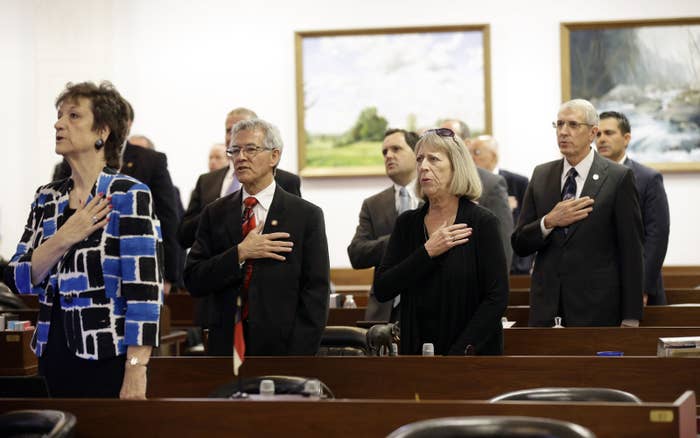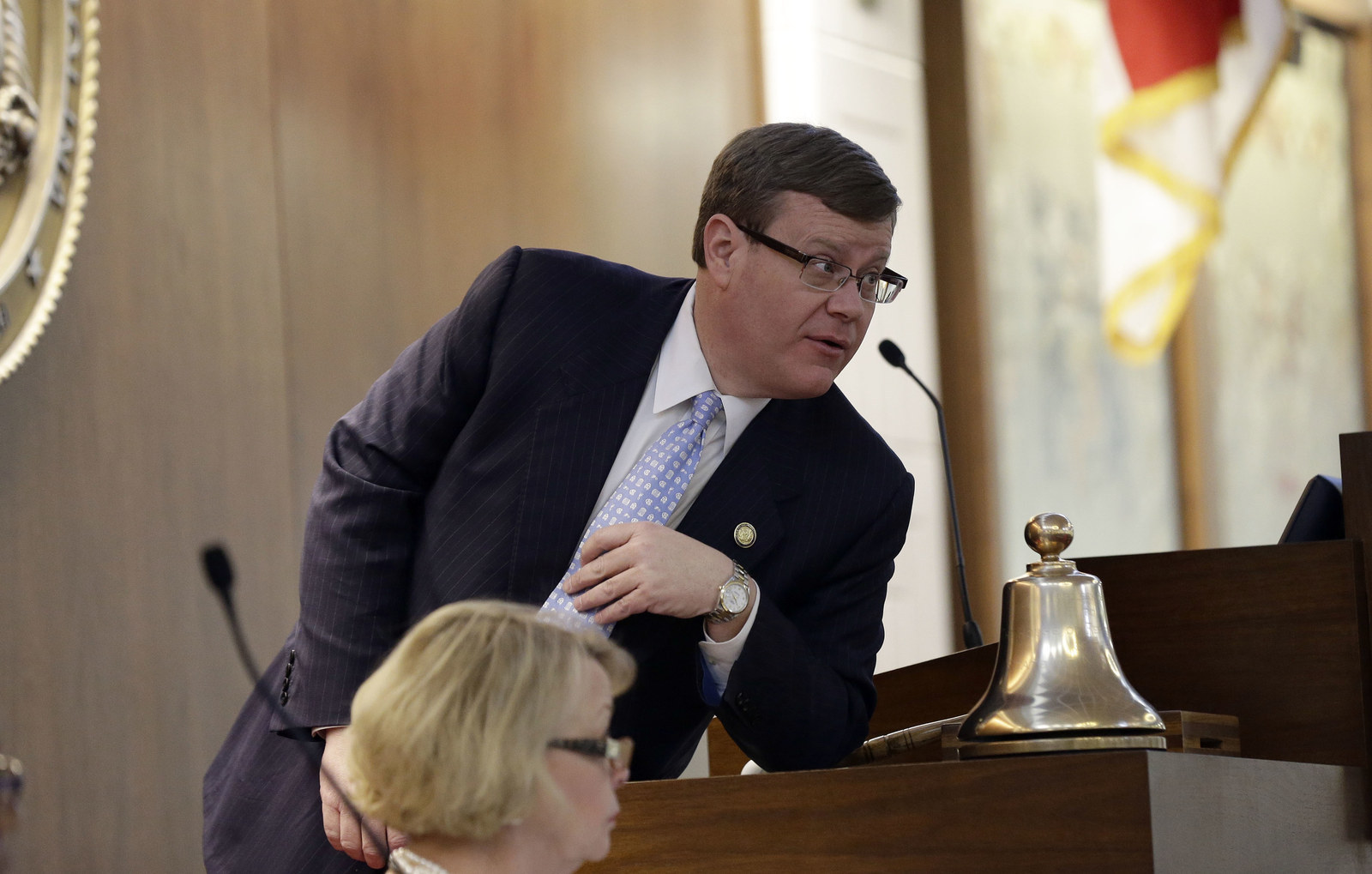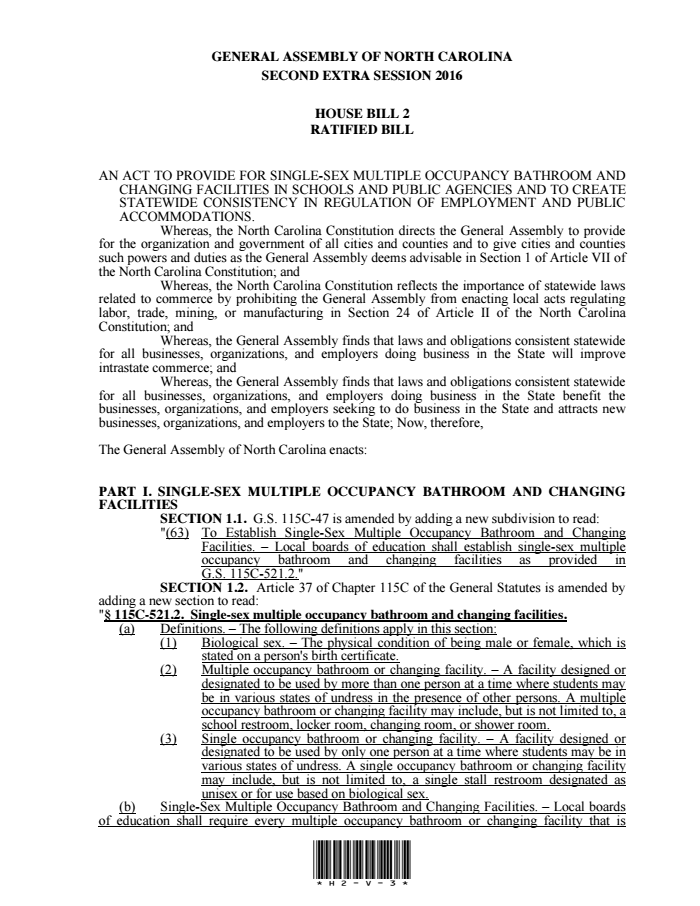
Republican leaders of the North Carolina General Assembly on Wednesday rushed through a bill to repeal all local LGBT nondiscrimination ordinances in the state and ban transgender people from certain restrooms.
Introduced and passed within 10 hours, the bill then went to Gov. Pat McCrory's desk. He signed it around 10 p.m. Wednesday, citing North Carolina residents' expectation of privacy and "basic community norms."
I signed bipartisan legislation to stop the breach of basic privacy and etiquette, ensure privacy in bathrooms and locker rooms.
Republicans had unveiled the legislation Wednesday morning, arguing the measure was needed to protect women from transgender people and sex predators. They were reacting to an ordinance in Charlotte — which had been scheduled to take effect April 1 — that would protect LGBT people from discrimination in housing and public accommodations.
The governor and other critics claimed the public accommodations portion of the city ordinance posed a safety threat by allowing transgender women, whom they called "men," to prey on women and girls.
“The basic expectation of privacy in the most personal of settings, a restroom or locker room, for each gender was violated by government overreach and intrusion by the mayor and city council of Charlotte," McCrory said in a statement that explained why he signed the bill into law.
The Charlotte ordinance, he continued, "defies common sense and basic community norms by allowing, for example, a man to use a woman's bathroom, shower or locker room."
The House voted 83–25 for the bill in the afternoon, and the Senate voted 32–0 Wednesday evening — a unanimous vote only because every Democratic senator walked out.
Senate Dems have started presser while session is still going on. They walked out of session. #ncga #ncpol
McCrory said the bill was "passed by a bipartisan majority," presumably referring to some votes from Democrats in the House.
House Bill 2 mandates that state law supersede all local ordinances concerning wages, employment, and public accommodations.
Despite the focus on Charlotte, the state's pre-emption law does more than stymie that city's ordinance.
House Bill 2 mandates that state law supersedes all local ordinances concerning wages, employment, and public accommodations. It also restricts single-sex public restrooms and locker rooms in publicly run facilities to people of the same sex on their birth certificate.
In addition, it bans transgender students from school restrooms that correspond with their gender identity — teeing up a potential legal clash with the federal government, which has found that civil rights laws ban transgender discrimination in schools.
The American Civil Liberties Union and Lambda Legal are exploring a legal challenge to the law. The advocacy groups warned in a statement that North Carolina could "lose billions in federal funds" for running afoul of Department of Education rules that ban transgender discrimination in public schools.
Nine other jurisdictions in the state have LGBT ordinances similar to Charlotte's.
Democrats and some businesses, including Dow Chemical, decried the bill as discriminatory on Wednesday, as did the state's attorney general, Roy Cooper, who is running for governor.
"That North Carolina is making discrimination part of the law is shameful," said Cooper. "It will not only cause real harm to families, but to our economy as well."
Democratic lawmakers had not been given a chance to read the bill Wednesday morning, which was introduced just an hour before its first committee vote. Democratic Rep. Bobby Richardson told fellow members of the House Judiciary IV Committee, “I’m not really sure what is in this bill."
In testimony before the committee, Christian conservatives said they were furious that Charlotte’s nondiscrimination ordinance would allow transgender women to use women’s restrooms, thereby letting “men” prey on women and girls.
John Rustin, president of the North Carolina Family Policy Council, told senators the Charlotte ordinance “means men could enter women restrooms and locker rooms — placing the privacy, safety, and dignity of women and the elderly at great risk.”

The specter of “men in women’s bathrooms” has been a common refrain among opponents of LGBT rights around the country.
Echoing those talking points, leaders of the House and Senate called the special session on Monday.
Lt. Governor Dan Forest and House Speaker Tim Moore, both Republicans, said in a statement they would address "a radical Charlotte City Council ordinance allowing men to share public bathrooms and locker rooms with young girls and women.”
However, there are no known instances in 17 states and 225 cities with laws banning LGBT discrimination of the policies being used to promote or defend predatory behavior in bathrooms or locker rooms.
"Repeating a lie over and over does not make it true," said Reverend Mykal Slack, taking on the anti-transgender bathroom message.
"I am a transgender male, and I am not a threat to you," he continued. "I go to work every day and go to church ever Sunday."
But LGBT groups have been reticent to directly rebut the bathroom messages in Charlotte or before Wednesday's legislative session, instead focusing on the broad protections of the city law for LGBT people. That approach appears to re-create the same strategy that ultimately failed to prevent voters from repealing Houston's LGBT ordinance last fall.
#HB2 debated in the NC House during special session. #KeepNCSafe #PatPromised
In contrast, transgender women have a well documented history of being the targets of hate-motivated assault and homicide. Alex McNeill, a transgender man who lives in North Carolina, told reporters on a phone call Tuesday, “A female friend of mine was punched in face exiting the women restroom by someone who thought she had been in the wrong bathroom.”
Trans women experience a greater risk of homicide than LGBT people as a whole, according to a June 2015 report by the National Coalition of Anti-Violence Programs. The report found hate-motivated violence against transgender people rose 13% in 2014 compared with the year before.
The Charlotte ordinance would ban discrimination on the basis of sexual orientation, gender identity, and gender expression in housing and places of public accommodation.
“I am a transgender male, and I am not a threat to you," Reverend Mykal Slack told senators.
Charlotte City Council Member John Autry supported the city's measure, telling BuzzFeed News in February that it protects vulnerable citizens from discrimination. But if the state tried to override the city, he said, “We have no legal leg to contest it with.”
North Carolina law empowers the state with strong control over local jurisdictions, allowing it to “preempt our authority,” Autry said. “If the state wanted to, they could come here to the government center, fire all of us, send us home, and run the city themselves.”
In 2015, Arkansas lawmakers passed a law preventing cities from passing laws that protect classes of people not already named in state law. The same year in North Carolina, Republicans tried to pass a similar law, but were thwarted by Democrats.
Under President Barack Obama, federal agencies have interpreted Title IX of the Education Act of 1972 — which bans discrimination in publicly funded schools on the basis of sex — to also ban transgender discrimination as a form of sex discrimination.
Two bills that would ban transgender students from using certain school restrooms died in South Dakota and Tennessee this month after concerns rose about federal litigation and loss of federal education funding,
Until Wednesday, no state had passed a law banning transgender students from school restrooms that correspond with their gender identity.
Alliance Defending Freedom, a religious legal group that opposes LGBT protections, praised the governor for signing the bill into law.
A statement from the group's legal counsel, Kellie Fiedorek, said, "The privacy rights and safety of North Carolina citizens shouldn’t be cast aside or used as a political pawn for special interest groups that desire to impose their agenda to create a genderless society."


